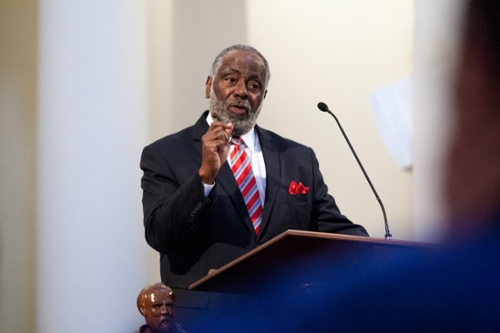
Samford University’s Beeson Divinity School has announced the creation of the Robert Smith Jr. Preaching Institute, named in honor of the school’s longtime faculty member of Christian preaching who holds the Charles T. Carter Baptist Chair of Divinity.
The purpose of the Smith Preaching Institute, which recently was approved by the Samford board of trustees, is to advance the mission of Beeson Divinity School and to strengthen the preaching of the gospel throughout the world.
The institute will aim to enhance the teaching of preaching and related subjects at Beeson Divinity by providing preaching resources to divinity students. Additionally, it will serve as a continuing education center for pastors and ministers by organizing and supporting conferences, workshops, and peer groups dedicated to the theology and task of preaching.
The institute is named after Smith for his more than 20 years of training men and women to preach the Scriptures with faithfulness, clarity and passion.
“Beeson’s Robert Smith Jr. Preaching Institute is perfectly named for one of the premier pulpit voices of our time,” said Timothy George, Beeson Divinity School dean. “At once scholarly and passionate, Dr. Smith preaches with exegetical precision and theological depth, and always with a pastor’s heart. His sermons reflect the richness of the African American tradition and reach out to the whole world for which Christ died.”
The institute is a product of a $500,000 Lilly Endowment Inc. grant that the divinity school received in 2013 to strengthen the quality of preaching. Due to Beeson Divinity’s effectiveness in this project from 2013-17, Lilly awarded an additional $250,000 in December 2017 to sustain the work of its preaching initiative. The creation and development of a preaching institute was one of the first major goals included in the proposal. Other goals include renovating the divinity preaching lab; creating or revising elective preaching courses, faculty workshops and development devoted to preaching instruction; and enhancing student learning in preaching.
“The creation of the institute represents the convergence of Beeson’s longstanding mission to prepare pastors who can preach and the Lilly Endowment’s Initiative to Strengthen the Quality of Preaching,” said Grant Taylor, Beeson Divinity associate dean for academic affairs and Lilly grant project director. “Through the Lilly Endowment initiative, we have been able to consolidate many of the strengths of Beeson’s faculty and curriculum as well as connections to partner churches and pastors.”
The Smith Preaching Institute will launch in the 2018–19 academic year. The search for a director is underway.
“We are excited to see how the teaching and learning at Beeson and the preaching and pastoral ministry in churches may amplify each other,” Taylor said. “We believe the Smith Preaching Institute could become a vital resource for Beeson’s service to the church and the church’s encouragement of Beeson. We look forward to enhancing an already high quality theological education––for students and friends––through this institute.
“We are confident that, as a result, Beeson Divinity School will continue to be a premier place for learning how to become a pastor who can preach,” he added. “We undertake this work with thankfulness to God for models and mentors like Dr. Smith and the rest of the Beeson faculty.”
